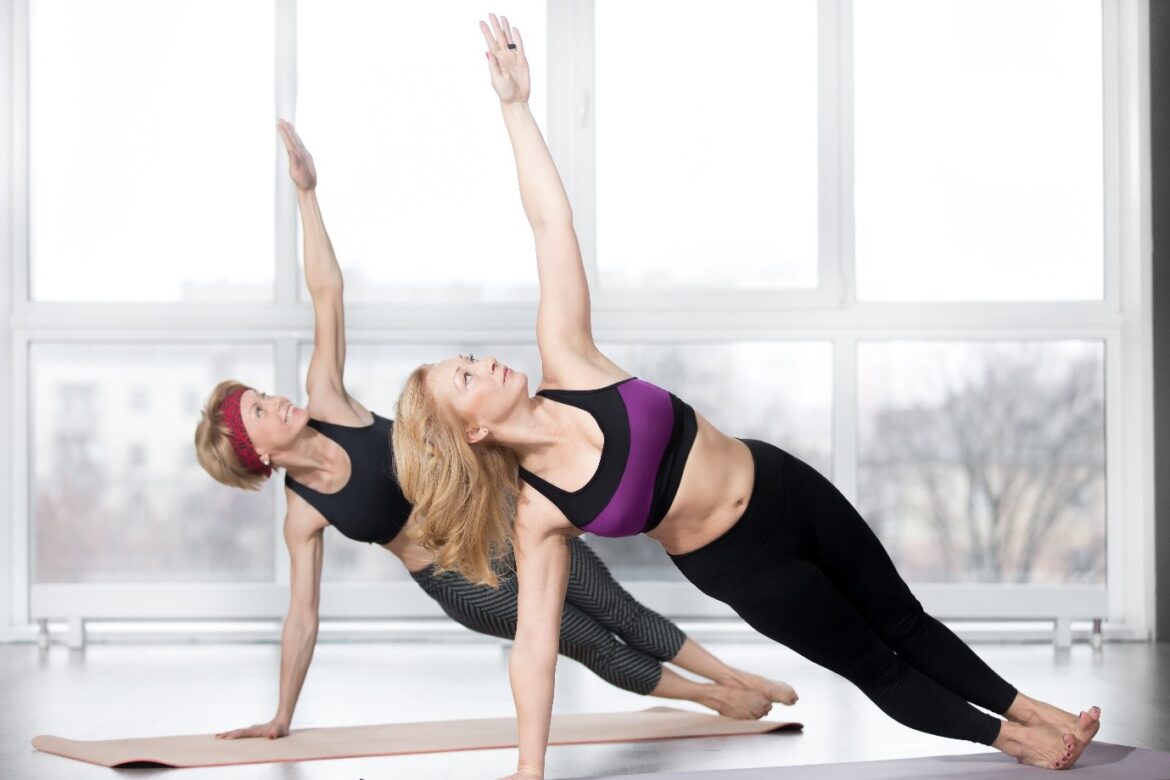Introduction
Does Pilates Help With Menopause: Pilates, a holistic approach to physical fitness developed by Joseph Pilates in the early 20th century, has gained widespread popularity for its focus on core strength, flexibility, and overall body awareness. While it is often lauded for its potential to improve posture and tone muscles, an emerging question in the world of women’s health is whether Pilates can also help alleviate some of the discomforts associated with menopause.
The link between Pilates and menopause is intriguing, as both focus on enhancing the body’s natural strength and resilience. However, understanding the potential benefits of Pilates for menopausal women requires a closer look at the specific challenges they face. Hormonal changes during menopause can lead to a decrease in bone density, muscle mass, and flexibility, making women more susceptible to issues like osteoporosis and joint pain. Furthermore, the emotional toll of menopause, including anxiety and depression, can impact one’s motivation to stay active.
This introductory exploration delves into the potential role of Pilates in mitigating the physical and emotional symptoms of menopause. We will examine how Pilates exercises can address menopausal concerns, from strengthening bones and muscles to enhancing mood and reducing stress. By exploring the scientific research and anecdotal evidence, we aim to provide women approaching or experiencing menopause with a better understanding of how Pilates may serve as a valuable tool in their journey toward greater well-being and quality of life during this transformative phase.

What is the best exercise for menopause?
One should aim for two hours and 30 minutes of moderate aerobic activity each week. Other deep breathing, yoga, and stretching exercises can help to manage the stress of life and menopause-related symptoms.
Aerobic Exercise:Aerobic exercises like walking, jogging, swimming, cycling, and dancing are excellent for managing weight, reducing the risk of heart disease, and improving mood. These exercises also increase cardiovascular fitness, which is crucial during menopause when the risk of heart disease rises.
Strength Training:Strength or resistance training, including weightlifting, resistance band exercises, and bodyweight exercises, helps preserve muscle mass and bone density, both of which decline during menopause. Strengthening exercises can also improve metabolism and support weight management.
Yoga:Yoga is a versatile exercise that promotes flexibility, balance, and relaxation. It can help manage stress, anxiety, and improve sleep quality—common challenges during menopause. Additionally, certain yoga poses can aid in strengthening bones and muscles.
Pilates:Pilates focuses on core strength, flexibility, and overall body awareness. It can help improve posture, muscle tone, and pelvic floor strength, which is particularly beneficial for menopausal women.
Is Pilates good for menopause weight loss?
The Pilates method’s reputation as a shortcut to “flat abs” does a disservice to its utility as a full-body workout. The method’s emphasis on cultivating a toned, strong midsection (known as the core or the “powerhouse”), however, can fight the menopausal tendency towards weight gain in this area.
Combine with Cardiovascular Exercise: Pilates is not a high-intensity cardiovascular workout, so it’s essential to incorporate some form of aerobic exercise into your routine. Activities like brisk walking, cycling, or swimming can help you burn more calories and support weight loss.
Dietary Choices: Menopause often comes with changes in metabolism, so it’s crucial to pay attention to your dietary habits. Focus on a balanced diet that includes lean proteins, whole grains, fruits, vegetables, and healthy fats.
Consistency: Like any exercise program, consistent practice is key to seeing results with Pilates. Aim for regular sessions, ideally several times a week, to experience the full benefits.
Consult a Professional: If you’re new to Pilates or have specific weight loss goals, consider working with a certified Pilates instructor or personal trainer who can tailor a program to your needs and monitor your progress.
Hormonal Changes: Menopause is a time when hormonal fluctuations can affect weight distribution. While Pilates can help tone muscles, it may not entirely prevent changes in body shape due to hormonal factors.
What is the Japanese diet for menopause?
From tofu to miso, the Japanese diet includes large amounts of soya products. These so-called phytoestrogens mimic the effects of oestrogen in the body and are thought to help with fluctuations in the hormone, hence their success in smoothing the rapid fluctuations brought on by the menopause.
Green Tea:Green tea is a significant part of the Japanese culture and diet. It contains antioxidants that can support overall health and potentially help manage weight, metabolism, and improve bone density, which is crucial during menopause.
Limited Dairy and Red Meat:The traditional Japanese diet is relatively low in dairy and red meat. Instead, the focus is on lean proteins like fish, tofu, and legumes. This can support heart health and potentially help manage weight.
Soy Products:Soy-based products like tofu, edamame, and soy milk are prevalent in the Japanese diet. Soy contains phytoestrogens, which may mimic the effects of estrogen in the body and help alleviate some menopausal symptoms.
Portion Control and Mindful Eating:Japanese culture encourages mindful eating and portion control. This approach can be helpful during menopause to manage weight and prevent overeating, which can become a challenge due to hormonal changes.
Regular Physical Activity:While not directly related to diet, the Japanese lifestyle often includes regular physical activity, such as walking and low-impact exercises, which can support weight management and overall well-being during menopause.
What removes menopause?
Hormone replacement therapy (HRT) HRT is a treatment that can relieve symptoms of early menopause and help your long-term health by replacing some hormones. It may not be suitable for all women so should be discussed with your medical team or a menopause specialist. There are many different types and doses of HRT.
Hormone Replacement Therapy (HRT): HRT involves taking medications containing hormones like estrogen and progesterone to alleviate many menopausal symptoms. It can be highly effective in reducing hot flashes, vaginal dryness, and mood swings. However, HRT carries some risks, and its use should be discussed with a healthcare provider to determine its suitability for an individual’s specific needs and health history.
Non-Hormonal Medications: Some non-hormonal medications, such as selective serotonin reuptake inhibitors (SSRIs) and selective norepinephrine reuptake inhibitors (SNRIs), can help manage mood swings and hot flashes.
Lifestyle Modifications: Certain lifestyle changes can make menopause more manageable. These include maintaining a balanced diet, regular exercise, getting adequate sleep, and managing stress. These strategies can help alleviate weight gain, mood swings, and sleep disturbances.
Vaginal Lubricants and Moisturizers: For vaginal dryness and discomfort, over-the-counter or prescription vaginal lubricants and moisturizers can provide relief.
Bone Health: Menopausal women are at increased risk of osteoporosis due to decreased estrogen levels. Calcium and vitamin D supplements, along with weight-bearing exercises, can help maintain bone density.
How to delay menopause Ayurveda?
Practice stress-busting Pranayama like Bhramari, Anulom Vilom and Kapal Bhati,”. “Enrich your diet with soya bean which is a great source of phytoestrogens. Include sesame seeds or til and walnuts in your diet,” Your meals should be split up into small portions and had throughout the day.
Ayurvedic Consultation: To receive personalized guidance on delaying menopause or managing its symptoms, consider consulting with a qualified Ayurvedic practitioner. They can assess your unique constitution (dosha) and recommend specific lifestyle, dietary, and herbal strategies tailored to your needs.
Detoxification: Ayurveda often incorporates periodic detoxification practices, known as Panchakarma, to help remove accumulated toxins from the body and improve overall health. Consult with an Ayurvedic practitioner to determine if this is suitable for you.
It’s essential to approach Ayurvedic practices with an open mind and as complementary to conventional medical care. While Ayurveda offers valuable insights into holistic health, it may not prevent or delay menopause, which is a natural part of a woman’s life journey. Always consult with a healthcare provider before making significant changes to your diet, lifestyle, or supplements, especially during the menopausal transition, to ensure that your approach is safe and suitable for your individual needs.
Can menopause be cured?
Menopause requires no medical treatment. Instead, treatments focus on relieving your signs and symptoms and preventing or managing chronic conditions that may occur with aging. Treatments may include: Hormone therapy.
Hormone Replacement Therapy (HRT): HRT involves the use of medications that contain hormones like estrogen and progesterone to replace the declining hormones in the body. HRT can be highly effective in reducing symptoms like hot flashes, vaginal dryness, and mood swings. However, its use comes with potential risks, and it should be discussed with a healthcare provider to determine its suitability for an individual’s specific needs and health history.
Non-Hormonal Medications: Some non-hormonal medications, such as selective serotonin reuptake inhibitors (SSRIs) and selective norepinephrine reuptake inhibitors (SNRIs), can help manage mood swings and hot flashes.
Lifestyle Modifications: Certain lifestyle changes can make menopause more manageable. These include maintaining a balanced diet, regular exercise, getting adequate sleep, and managing stress. These strategies can help alleviate weight gain, mood swings, and sleep disturbances.
Vaginal Lubricants and Moisturizers: For vaginal dryness and discomfort, over-the-counter or prescription vaginal lubricants and moisturizers can provide relief.
Bone Health: Menopausal women are at increased risk of osteoporosis due to decreased estrogen levels. Calcium and vitamin D supplements, along with weight-bearing exercises, can help maintain bone density.
What is the healthiest menopause diet?
Additionally, many women going through menopause experience unpleasant symptoms, such as hot flashes and poor sleep. A whole-foods diet high in fruits, vegetables, whole grains, high-quality protein and dairy products may reduce menopause symptoms.
Calcium and Vitamin D:Menopausal women are at an increased risk of bone loss. Ensure an adequate intake of calcium-rich foods like dairy products (or fortified non-dairy alternatives), leafy greens, and almonds. Vitamin D, which aids in calcium absorption, can be obtained from sunlight exposure or supplements.
Phytoestrogens:Phytoestrogens are plant compounds that may mimic the effects of estrogen in the body. Foods rich in phytoestrogens include soy products (tofu, edamame), flaxseeds, whole grains, and legumes. These foods may help alleviate hot flashes and other menopausal symptoms.
Hydration:Staying well-hydrated is crucial during menopause. Drink plenty of water, herbal teas, and avoid excessive caffeine and alcohol, as they can exacerbate symptoms like hot flashes and sleep disturbances.
Limit Processed Foods and Added Sugars:Minimize your intake of processed foods, sugary snacks, and sugary beverages. These can contribute to weight gain and exacerbate mood swings and energy fluctuations.
What are trigger foods for menopause?
If you’re having hot flashes during menopause, you may find it helps to avoid certain “trigger” foods and drinks, like spicy foods, caffeine, and alcohol.
Spicy Foods: Spicy foods, especially those containing hot peppers and chili, can trigger or worsen hot flashes and night sweats, which are common menopausal symptoms.
Caffeine: Excessive caffeine intake, found in coffee, tea, energy drinks, and some sodas, can disrupt sleep patterns, exacerbate anxiety, and contribute to mood swings. It can also worsen hot flashes for some women.
Alcohol: Alcohol can disrupt sleep, contribute to mood swings, and increase the intensity and frequency of hot flashes and night sweats. It can also lead to weight gain when consumed in excess.
Sugar and Sweets: High-sugar foods and sweets can lead to energy crashes and mood swings. They can also contribute to weight gain, which is a common concern during menopause.
Processed Foods: Processed foods often contain high levels of sodium, which can lead to water retention and bloating. Excess sodium can also contribute to high blood pressure, which is a risk that may increase during menopause.

Conclusion
We have discovered that Pilates offers several potential benefits for menopausal women. Its emphasis on core strength and flexibility can help counteract the muscle and bone density loss that often occurs during menopause, reducing the risk of osteoporosis and joint discomfort. The mindful and controlled movements characteristic of Pilates can enhance body awareness and posture, addressing issues related to physical changes like weight gain and altered body composition.
Equally significant is Pilates’ influence on mental and emotional well-being. As menopause often brings mood swings, anxiety, and depression, Pilates provides a means of reducing stress and improving mood through its meditative aspects and focus on controlled breathing. The mind-body connection cultivated in Pilates sessions can empower women to regain a sense of control over their bodies and emotions during this transformative phase of life.
The supportive and communal environment of Pilates classes can foster a sense of camaraderie among menopausal women, offering emotional support and motivation to stay active and committed to their fitness goals. In essence, while Pilates alone may not be a panacea for all menopausal symptoms, it certainly holds promise as a complementary therapy that can enhance the overall quality of life during this stage. It offers women a holistic approach to health and well-being, addressing both the physical and emotional aspects of menopause.


3 comments
… [Trackback]
[…] Information on that Topic: thefitnessblogger.com/does-pilates-help-with-menopause/ […]
… [Trackback]
[…] Information on that Topic: thefitnessblogger.com/does-pilates-help-with-menopause/ […]
… [Trackback]
[…] Here you will find 72720 more Info on that Topic: thefitnessblogger.com/does-pilates-help-with-menopause/ […]